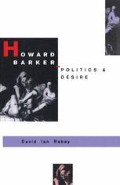Abstract
Allied but opposed considerations of social independence and the supportive family unit are natural dramatic means to exposing the essential link between public and private, political and personal facets of conduct and identity. Henrik Ibsen’s Pillars of the Community (1877) is a notable formulation of the theme, depicting a supposedly exemplary member of the community, Karsten Bernick, who precipitates a dilemma by acting in accord with his interpretation of society’s prescriptions: Bernick permits the dangerous voyages of an unseaworthy vessel, kept afloat through persistent but perilously frail patchwork, in order to build an empire of profit for his family, particularly his son — then discovers that his son is aboard the vessel. With tragic irony, capitalism endangers even those who are ostensibly successful through maintaining its existence, and also the innocents, like Bernick’s son, on whose behalf Bernick claims to be labouring. Social distortions wreak their effects on future generations and competition for power informs private life; in the words of Leo Lowenthal, ‘Life becomes a game that one hopes to win by achieving success, only to find that the specialization and exertion required for this success add up, after all, to failure’.1
I hate maturity. Mature notions, mature writers, it’s a con to rub the edge off a decent blade.
Downchild
The old know nothing. Fling them down. They made the world and they need punishing.
The Castle
Forgive me. The young are vile.
The Possibilities
Access this chapter
Tax calculation will be finalised at checkout
Purchases are for personal use only
Preview
Unable to display preview. Download preview PDF.
Notes
Leo Lowenthal, ‘Henryk Ibsen: Motifs in the Realistic Plays’, in Rolf Fjelde (ed.), Ibsen: A Collection of Critical Essays (New Jersey: Englewood Cliffs, 1965) pp. 142–3.
Simon Trussler (ed.), New Theatre Voices of the Seventies (London: Methuen, 1981) p. 186.
Tony Dunn, ‘Howard Barker: Socialist Playwright for our Times’, in Gambit XI no. 41 (London: John Calder, 1984) p. 60.
John Berger and others, Ways of Seeing (London: Penguin, 1972) p. 133.
Copyright information
© 1989 David Ian Rabey
About this chapter
Cite this chapter
Rabey, D.I. (1989). Independence and the Family. In: Howard Barker: Politics and Desire. Palgrave Macmillan, London. https://doi.org/10.1007/978-1-349-19910-5_3
Download citation
DOI: https://doi.org/10.1007/978-1-349-19910-5_3
Publisher Name: Palgrave Macmillan, London
Print ISBN: 978-1-349-19912-9
Online ISBN: 978-1-349-19910-5
eBook Packages: Palgrave Literature & Performing Arts CollectionLiterature, Cultural and Media Studies (R0)

